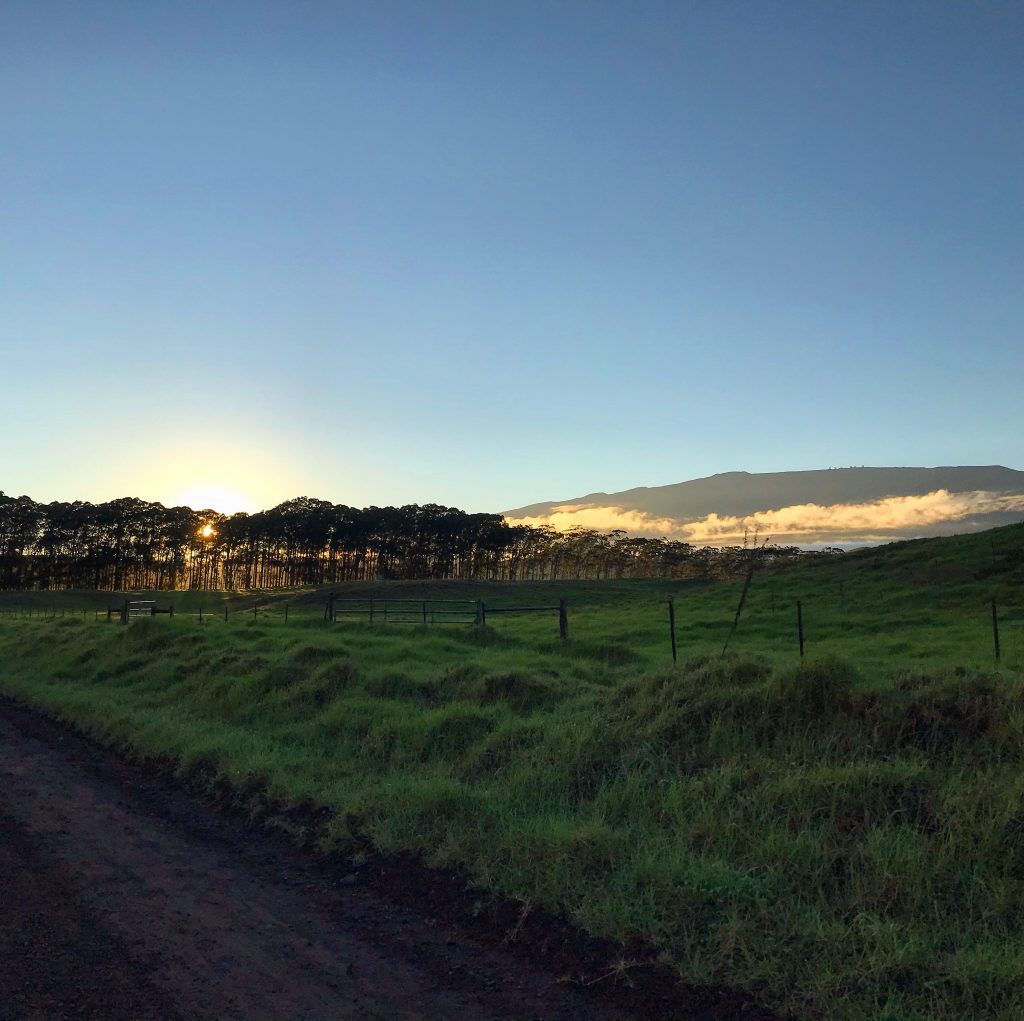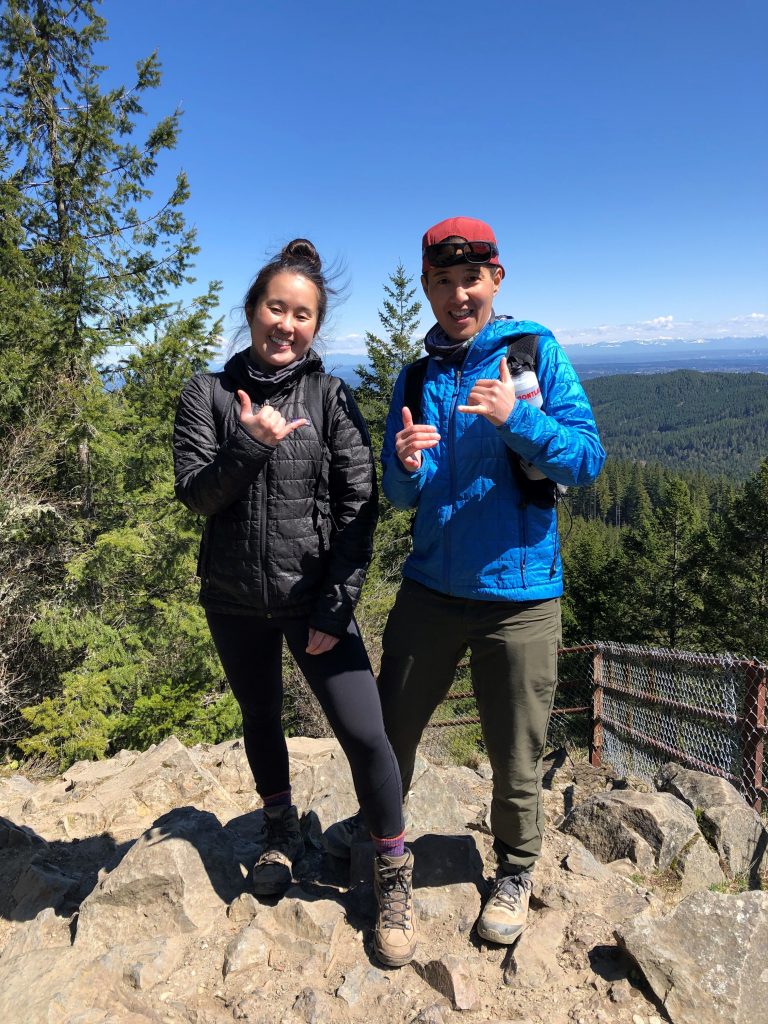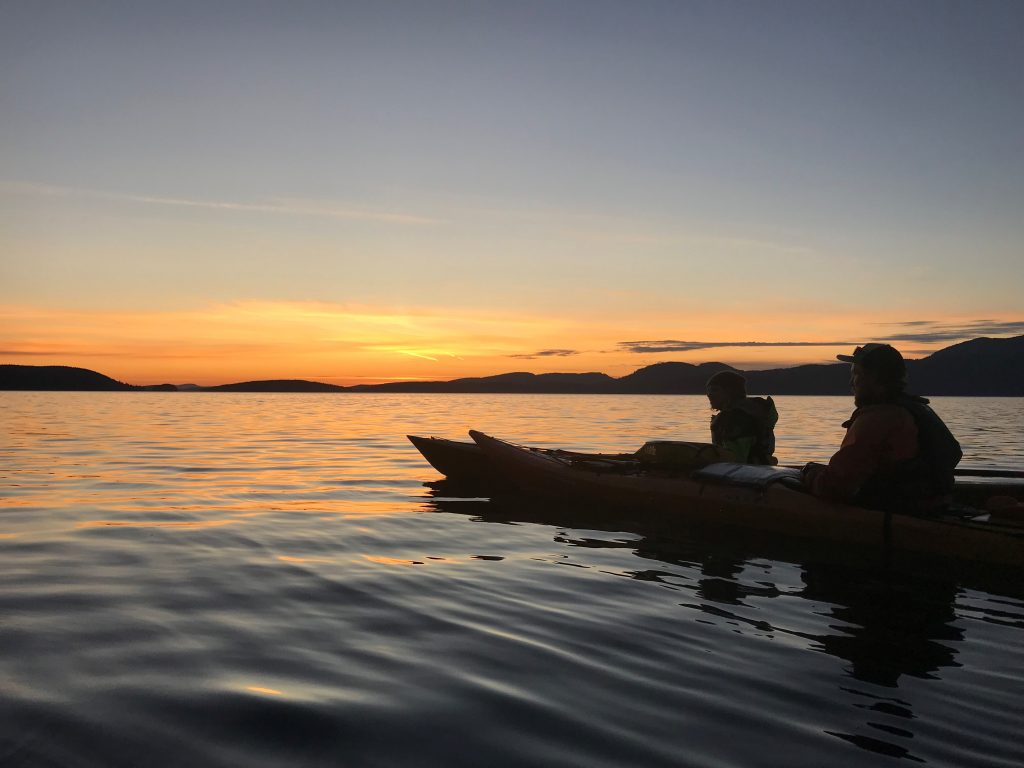Caitie Kimura has been with the Coalition for nearly two years now. Caitie writes all the thoughtful stories of our community that you see on our monthly e-newsletters. Due to the ongoing pandemic, we’ve yet to meet in person. However, through many Team chats, I’ve had the privilege of getting to know Caitie better. During our chat last week, we talked about her connection to the outdoors, growing up in Hawai’i, and how her perspective has shaped her approach when it comes to telling stories about communities. We also talked about her favorite foods, reflected on how the pandemic has shaped our work at the Coalition, and more!
DEWI: You spend a lot of time outdoors. You seem to be biking a lot recently. Do you have a favorite area to bike?
CAITIE: Well, the place that I love most to bike is on Mana Road, on the Big Island. It’s the road that I grew up on, and 2.5 miles up the road from my parent’s house it becomes a dirt cattle road. When I moved to Seattle, I didn’t start biking again until about 4 years ago to commute to work and I did a few triathlons. But in early 2021 I got into gravel biking, and now I’m hooked! It reminds me of riding bikes at home on Mana which I love since I haven’t been home in over a year. It’s also been really nice in the pandemic to be able to get outside close to the city and ride on gravel roads with no or very little traffic and where people are able to really spread out. I’ve also been able to see way more WWRP projects while biking.
DEWI: I imagine it feels comforting and familiar to be riding on gravel. Tell me a little more about Mana Road.
CAITIE: Yeah, it feels very familiar. On Mana aren’t many people or cars. It’s just pasture and some cows everywhere, and you’re staring up at Mauna Kea. It’s gorgeous and so quiet. My grandpa used to work at an old dairy farm on Mana when he was young. The farm is gone now, but there’s still some rock foundation there and it’s cool to go back up and see it.

Mana Road, Hawai’i
DEWI: Knowing very little about Hawai’i, I’m very curious about the food there. What are some foods you’d get there that you wouldn’t necessarily get here in Washington?
CAITIE: There are some ingredients we don’t get out here, a lot of the reef fish, like Menpachi. I’m also spoiled because I live with my sister, who is a chef, and when she cooks there are a lot of flavors of home. A lot of the local dishes are a mixture of all different cultures, like Japanese, Korean, Chinese, and Filipino mixed in with Hawaiian dishes.

Caitie and her sister, Cecily
DEWI: So, I feel like Hawai’i is the vacation destination for a lot of families. Partly because I also grew up on an island that’s a tourist destination whose history isn’t well-learned, I think twice every time I think I’d like to visit Hawai’i. What advice would you have for someone like me, who has an interest in visiting, but in a way that’s respectful?
CAITIE: Definitely do your research. Learn about the history. I think learning about the history of the place you’re going to is really important. If you can ask someone who is from there to share that resource and they can steer you in a good direction. It’ll help your trip and also, you’ll get a better understanding about the culture.
DEWI: And I think that’s the goal, right? To understand better so that you understand the spaces you’re entering into.
CAITIE: Right, for me, I’m from Hawai’i but I’m not Kānaka Maoli, Native Hawaiian. I’m 3rd generation Japanese; Chinese; and Korean, my great grandparents immigrated to Hawai’i in 1898, the year Hawai’i was illegally annexed by the United States, six years after the attempted illegal overthrow of the Kingdom of Hawai’i on January 16, 1893, which lead to surrender by the Executive Monarch, Queen Lili’uokalani, the following day. My family has benefited from while also being exploited by colonialization. It’s important we learn and understand our responsibility to take care of the land we grew up on. For example, if there are places that are being overvisited, you just don’t go. Even for me, I want to go to certain beaches, but I know there are a lot of people going, I’ll go somewhere else. Take the time to really understand your footprint, too. Not to say that you can’t go and visit a place, but how can you still be respectful of the land and the culture and have less of an impact on the places that are heavily visited. If this were your own home and you had to come back to it every day, would you be as comfortable doing certain things? I think the history and on-going history of many places is traumatic, messy, and complicated but we should be taking the time and responsibility to learn about it and the original stewards of the land.
It’s important we learn and understand our responsibility to take care of the land we grew up on.
DEWI: I really appreciate your framing of that. Reflecting on your role at the Coalition, I feel like it’s really evolved in the years you’ve been here. It’s especially cool to see you interact with people in the community about their stories. How do you balance it all? How did you start talking with folks about their stories?
CAITIE: After almost 2 years, with my admin role, it’s something I’m familiar with. But engaging with the community, that’s completely new to me. I kind of grew into it. The Coalition needed me to work on the newsletter and telling stories was something I fell into. It’s started to evolve into something that I’m really proud of. Talking to people in the community about their stories, I didn’t always see these stories being told, so I’m just like, well, these are cool people doing really rad things. I want to hear about them. I’m sure other people want to hear about them too. So why not use this platform to let them tell their story? It was a great excuse for me to talk to these folks for a few hours, just about the things that they’re up to, and be able to share it with others.
DEWI: After working remotely and navigating the pandemic for a year, so much of our work at the Coalition has grown. What are some things you’re looking forward to this year?
CAITIE: I think we have a lot to learn from 2020. I think 2020 has taught us as a staff that we can make change and we can make small changes quickly. It’s showed us things we thought we couldn’t do, like work remotely full-time, we could do, we just needed to be creative. I think that opens the door for so many other things. At the Coalition level: Something that was not on the radar was the equity proviso. To make something happen in months, to possibly have $5 million in community grant money and $375,000 for an equity review of state grant programs just shows us that it’s OK to think outside of the box. It’s OK to change things up. And these small changes can have a bigger ripple effect into making big change for the state. So that’s what I’m excited about in 2021: To not lose sight of 2020 and what it’s showed us is possible. But also growing from that and starting to think even bigger. What other things can we do to create bigger change? I’m also very excited for the change in weather: spring/summer/fall and the more things we can start doing outside.
It’s OK to change things up. And these small changes can have a bigger ripple effect into making big changes for the state.
DEWI: I also know that you also surf, I feel like surfing isn’t as common of an outdoor activity in Washington. How did you get into it?
CAITIE: Well, I didn’t grow up surfing, I played a lot of team sports. No one in my family surfed, so I had no one to tag along with. When I moved home for a year after college, started to learn and then moved back to the mainland. It wasn’t until 2 years ago, when I started dating my partner, Lindsay, who is a surfer, and I was like: Yes! Okay! I have somebody to surf with now!
DEWI: Is there a place in Washington that’s special to you?
CAITIE: Okay, this is hard. There are so many special places. But I probably would have to say the San Juan Islands. Right before I started working at the Coalition I went kayak camping on Sucia, an island in the San Juan’s, for a few days. It was probably the most freeing feeling I’ve had while living in Washington. I didn’t have to be back at any time, I didn’t have to worry about work emails, and I didn’t really have to worry about anything. On another trip we kayaked from Orcas Island to Matia Island and saw orcas from a distance on the water. That was the first time I’d ever seen orcas in Washington. I was stoked!

Caitie kayaking on the San Juan Islands
It was such a pleasure to get to know Caitie better and to learn about her enthusiasm for the outdoors, for thoughtful reflection, and for community. A big thank you to Caitie for taking the time to share her story! If you would like to get in touch with Caitie, you can contact her here.
